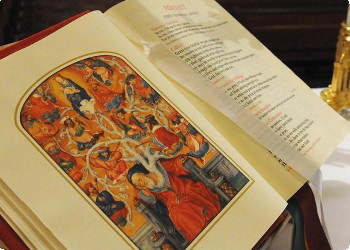Doesn’t your teacher pay the temple tax?
13 AUGUST (Mt 17,22-27)
The tax for the temple of Jerusalem has historical roots that are from time out of mind. Every good Israelite submitted to it, contributing according to his needs. However, it was the House of God and deserved to be kept with great decorum. The prophets always paid attention to the temple and the life that took place in it. They intervened in its favour, taking its defense.
Joash was seven years old when he became king, and he reigned forty years in Jerusalem. His mother, named Zibiah, was from Beer-sheba. Joash did what was pleasing to the Lord as long as Jehoiada the priest lived. Jehoiada provided him with two wives, and he became the father of sons and daughters. After some time, Joash decided to restore the Lord’s temple. He called together the priests and Levites and said to them: “Go out to all the cities of Judah and collect money from all Israel that you may repair the house of your God over the years. You must hasten this affair.” But the Levites did not hasten. Then the king summoned Jehoiada, who was in charge, and said to him: “Why have you not required the Levites to bring in from Judah and Jerusalem the tax levied by Moses, the servant of the Lord, and by the assembly of Israel, for the tent of the testimony?” For the wicked Athaliah and her sons had damaged the house of God and had even turned over to the Baals the dedicated resources of the Lord’s temple. At the king’s command, therefore, they made a chest, which they put outside the gate of the Lord’s temple. They had it proclaimed throughout Judah and Jerusalem that the tax which Moses, the servant of God, had imposed on Israel in the desert should be brought to the Lord. All the princes and the people rejoiced; they brought what was asked and cast it into the chest until it was filled. Whenever the chest was brought to the royal officials by the Levites and they saw that it contained much money, the royal scribe and an overseer for the high priest came, emptied the chest, then took it back and returned it to its place. This they did day after day until they had collected a large sum of money. Then the king and Jehoiada gave it to the workmen in charge of the labor on the Lord’s temple, who hired masons and carpenters to restore the temple, and also iron- and bronze-smiths to repair it. The workmen labored, and the task of restoration progressed under their hands. They restored the house of God according to its original form, and reinforced it. After they had finished, they brought the rest of the money to the king and to Jehoiada, who had it made into utensils for the Lord’s temple, utensils for the service and the holocausts, and basins and other gold and silver utensils. They offered holocausts in the Lord’s temple continually throughout the lifetime of Jehoiada. Jehoiada lived to a ripe old age; he was a hundred and thirty years old when he died. He was buried in the City of David with the kings, because he had done good in Israel, in particular with respect to God and his temple. (2Chro 24,1-16).
Today Jesus is asked to pay the temple tax. Jesus uses this request to unravel his mystery, to tell us what the real relationship that exists between Him and the Father is. He is the Son of the Father and as such he must not pay any tax. Jesus is not the adopted son of the Father, he is not a son by creation, and not even because he is a part of the people of the Covenant. Jesus is son by eternal generation, because Light gives Light, begotten, not created, of the same substance of the Father. This is the sonship of Jesus.
As they were gathering in Galilee, Jesus said to them, “The Son of Man is to be handed over to men, and they will kill him, and he will be raised on the third day.” And they were overwhelmed with grief. When they came to Capernaum, the collectors of the temple tax approached Peter and said, “Doesn’t your teacher pay the temple tax?” “Yes,” he said. When he came into the house, before he had time to speak, Jesus asked him, “What is your opinion, Simon? From whom do the kings of the earth take tolls or census tax? From their subjects or from foreigners?” When he said, “From foreigners,” Jesus said to him, “Then the subjects are exempt. But that we may not offend them, go to the sea, drop in a hook, and take the first fish that comes up. Open its mouth and you will find a coin worth twice the temple tax. Give that to them for me and for you.”
Though not having to pay the tax, Jesus submits to it in order not to scandalize the little ones in faith. By so doing, he teaches every one of his disciples to be always above reproach. Nobody must tell anything not honest, not good, not right, not true, and not saint, on his person, his faith, and his morality. Today Jesus teaches us that the good name must always be cultivated with great care.
Virgin Mary, Mother of the Redemption, Angels, and Saints free us from any scandal.





